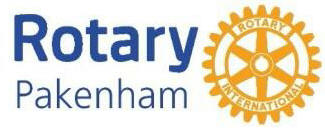Dear Rotary Club of Pakenham,
I am writing to sincerely thank you for your very generous donation which allowed our family to purchase a disability stroller for our youngest member Isabella. She was born with a genetic condition called Williams Syndrome which affects 1 in 10,000 people worldwide. It is known to occur equally in both males and females and in every culture.
Children with Williams Syndrome tend to be social, friendly and endearing. Parents often say the joy and perspective a child with Williams Syndrome brings into their lives had been unimaginable.
Isabella attends school at Officer Specialist and recently turned 7 years old. She loves school and especially going to school on the bus each day. Isabella loves to go out and meet new people but this has been challenging due to Isabella having low muscle tone and low stamina levels.
Low muscle tone and fatigue are ongoing problems for children with Williams Syndrome and many children need assistance with mobility through the use of a wheelchair or disability stroller.
The use of Isabella's disability stroller has greatly improved our ability to plan family outings which Isabella can enjoy with her family and friends. We are extremely grateful for your generosity and plan to use this stroller for many years to enable Isabella to continue outings within the community.
Please extend our sincere thanks to all of those within the Pakenham Rotary Club.
Kind regards and many thanks Cassie and Isabella
Below is some information regarding Williams Syndrome. Further information can also be found at:Williams Syndrome Association<https://williams-syndrome.org/>
Williams Syndrome Association
Williams syndrome (WS) is a genetic condition that is present at birth and can affect anyone. It is characterized by medical problems, including cardiovascular disease, developmental delays, and learning challenges.
These often occur side by side with striking verbal abilities, highly social personalities and an affinity for music.
These often occur side by side with striking verbal abilities, highly social personalities and an affinity for music.
Williams syndrome is caused by the spontaneous deletion of 26-28 genes on chromosome #7. The deletion occurs in either the egg or the sperm used to form the child with Williams syndrome. Accordingly, the deletion is present at the time of conception. It is likely that the elastin gene deletion accounts for many of the physical features of Williams syndrome.
Some medical and developmental problems are probably caused by deletions of additional genetic material near the elastin gene on chromosome #7. The extent of these deletions may vary among individuals. In most families, the child with Williams syndrome is the only one to have the condition in his or her entire extended family. However, the individual with Williams syndrome has a 50% chance of passing the disorder on to each of his or her children.
